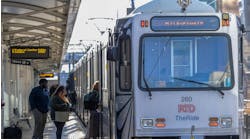MA: Bill Would Ban Liquor Ads on State Property
Source Sentinel & Enterprise (Fitchburg, Massachusetts)
BOSTON -- A Lowell lawmaker wants Boston to join dozens of other major U.S. cities seeking to ban liquor advertising in their public transportation systems, saying it will curb underage drinking.
State Rep. David Nangle, a Democrat, is pushing a bill that would make it illegal to advertise alcoholic beverages on any state-owned property.
The legislation is targeting the MBTA subway system, said Nangle, where ads showcasing alcoholic beverages such as Amstel Light and Landshark beer can routinely be seen on platforms and subway cars.
"We're always trying to teach our youth about the effects of alcohol, yet at the same time, you have college kids who are 17 or 18 riding the subway, and here we are promoting it," said Nangle Wednesday. "It's kind of in their face, so to speak. It sets a bad example and sends a message to these underage college kids that, hey, it's OK to drink."
Cigarette advertisements and ads containing violence and nudity are already prohibited on the state-funded MBTA because they are deemed inappropriate.
The cities of Chicago, Los Angeles, Philadelphia, San Francisco and Washington D.C. have policies that prohibit alcohol ads on public-transit systems, according to Michele Simon, a spokeswoman for the Marin Institute, an alcohol-industry watchdog.
Marin said Boston and New York are the only major cities to allow for alcohol to be advertised on public transportation systems.
"Boston needs to catch up with the rest of the country," said Marin. "Every city bears a significant economic cost from the harm of alcohol. It seems counter productive for a city like Boston to sell advertising to the alcoholic industry to essentially target youth and the rest of us, and at the same time turn around and pay for the treatment of the harm that comes with alcohol."
Nangle said he was not sure what the financial impact of pulling liquor ads from the MBTA would be.
The cash-strapped MBTA is in the process of eliminating a $130 million deficit for the coming year. As part of a plan to reduce that figure, the agency is looking to put up more billboards and sell ads on the CharlieCard and on the MBTA website.
Nangle believes the MBTA could find companies to buy the ad space currently being used to promote alcohol.
"Granted there is good revenue, but I'm sure to take the place of all these advertisements, there would be a number of companies ready to line up," he said.
An MBTA spokeswoman was unable say what the economic impact of the bill would be yesterday.
A November 2009 study conducted by Boston Univeristy revealed that on a typical weekday, the alcohol advertising exposure among Boston youths, ages 11-18, via MBTA trains is 5.5 times greater than a televised Super Bowl commercial. Approximately 10,000 Boston Public School commuters use the transit system daily.
The researchers recorded the number of alcohol advertisements on each of the four MBTA subway lines: the red, green, orange, and blue lines. The researchers found 267 alcohol advertisements on 142 subway cars, or an average of about two alcohol ads per car.
That translates to 1.2 million advertising exposures on a typical weekday. The research team estimated that there are 18,000 advertising exposures on a typical weekday among youths.
Nangle testified before the Committee on State Administration and Regulatory Oversight yesterday that ads promoting alcohol send the wrong message to kids. Nangle and Rep. Martin J. Walsh, D-Boston, have filed similar bills in the past, but they have failed to get out of committee.
Nangle hopes this year is different.
"We've got these kids riding up and down the subway on a daily basis going to and from class," he said. "Maybe I'm old school, but I'm thinking out of site, out of mind."
Copyright 2008 LexisNexis, a division of Reed Elsevier Inc. All rights reserved.
Terms and Conditions | Privacy Policy


